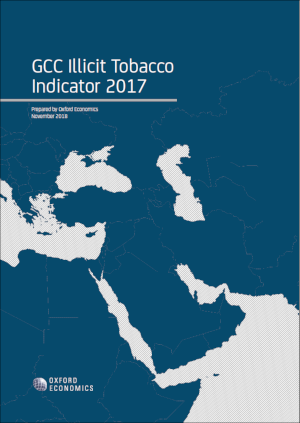Ungated Post | 14 Dec 2018
GCC Illicit Tobacco Indicator 2017

New analysis from Oxford Economics show that incidence of illicit tobacco across four GCC markets (Saudi Arabia, UAE, Kuwait and Oman) has increased in recent years – having been just 1.2% of Total Consumption in 2016, the Illicit Incidence rose to 1.6% of Total Consumption in 2017 and to 5.3% in the first half of 2018.
This Report establishes estimates of consumption of illicit cigarettes and the impact this has on tobacco tax revenue using a methodology established in our work on the same issue in Asian markets.
Read the full report in Arabic
Our economic consulting team are world leaders in quantitative economic analysis, working with clients around the globe and across sectors to build models, forecast markets and evaluate interventions using state-of-the art techniques. Lead consultants on this project were:
Oxford Economics’ team is expert at applying advanced economic tools that provide valuable insights into today’s most pressing business, financial and policy issues.
To find out more about our capabilities, contact:
EMEA
Tom Rogers
+44 (0)203 910 8047
Email
Americas
Scott Livermore
+1 (646) 480 5730
Email
Asia
Oliver Salmon
+65 6850 0123
Email
Related Services

Post
The economic impact of abandoning the WTO
Oxford Economics have been commissioned by the International Chamber of Commerce (ICC) to provide an independent assessment of the economic impact of WTO dissolution. This report details our findings and the assumptions underpinning our analysis.
Find Out More
Post
The economic impact of the sports activities of public service media
This study shows how the sports activities of public service media supported €4.5 billion of GDP and 57,000 jobs across 31 European countries in 2022. The report also highlights wider economic benefits of public service media sports coverage, such as the way in which it leverages sponsorship income for sports bodies.
Find Out More
Post
Global Trade Education: The role of private philanthropy
Global trade can amplify economic development and poverty alleviation. Capable leaders are required to put in place enabling conditions for trade, but currently these skills are underprovided in developing countries. For philanthropists, investing in trade leadership talent through graduate-level scholarships is an opportunity to make meaningful contributions that can multiply and sustain global economic development.
Find Out More